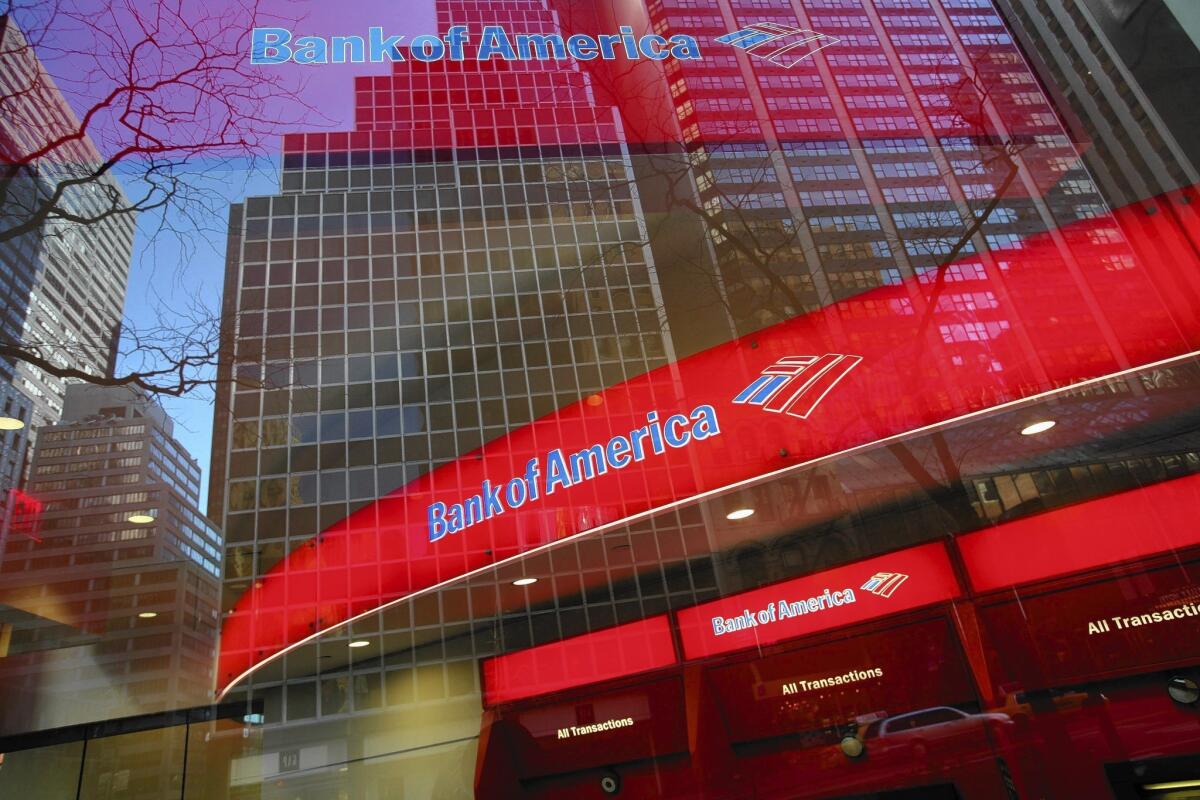BofA’s legal costs mount in Countrywide mortgage fiasco

- Share via
NEW YORK — A federal judge will soon decide how much Bank of America should pay for some of Countrywide Financial Corp.’s sins in the lead-up to the financial crisis.
Federal prosecutors want BofA to pay $864 million after the bank’s stinging defeat in a major civil fraud trial in October. A jury found BofA liable in a case centered on a Countrywide program called “The Hustle,” which churned out risky home loans before selling them to mortgage giants Fannie Mae and Freddie Mac.
But whatever penalty the bank might pay, it will amount to a mere drop in the bucket of BofA’s legal bills — much of it stemming from its ill-fated acquisition of the former Calabasas mortgage lender in 2008.
“It’s chump change,” said Dick Bove, bank analyst at Rafferty Capital Markets.
The bank already has shouldered about $50 billion in loan and foreclosure losses, lawsuit settlements and investigations and legal defense costs stemming from its purchase of Countrywide, just as the housing market cratered.
That’s some 20 times the $2.5 billion in stock that BofA paid in July 2008 for Countrywide, which had become America’s No. 1 home lender by promoting every type of high-risk mortgage devised during the easy-money era of the housing boom.
The bank and analysts foresee its already hefty legal tab ballooning by billions more. BofA has projected $23 billion in additional exposure for legal expenses and costs related to buying back or making good on faulty mortgages. That doesn’t include reserves already set aside for legal costs, which the bank doesn’t disclose.
“It was one of the worst deals done in the height of the property fiasco,” said Jeffrey Manns, a law professor at George Washington University. “This is a deal they went into because they were greedy … where they saw the upside of the shady practices Countrywide was engaged in.”
Bank of America has said it may appeal the jury’s verdict in the civil fraud case in New York. The bank has asked U.S. District Judge Jed Rakoff for zero penalties, arguing that any fines would hurt its “innocent shareholders.”
The jury’s verdict in the case involving “The Hustle” could also weaken Bank of America’s hand as it faces other major lawsuits targeting Countrywide’s junk loans.
One major case facing BofA: A roughly $10-billion lawsuit filed two years ago by insurance giant American International Group Inc. over soured mortgage investments. It’s believed to be the largest private lawsuit filed in the wake of the financial crisis.
Roughly half of the damages sought by AIG involve mortgages bundled into investments by Countrywide, and the portion of the suit involving those claims has been playing out in federal court in Los Angeles. No trial date has been set in the AIG-Countrywide case. Both sides have begun the discovery process.
Another major unresolved case: a lawsuit filed by the regulator of Fannie and Freddie, the Federal Housing Finance Agency. The suit is among the 18 the FHFA filed in 2011 over faulty mortgage bonds that housing giants Fannie Mae and Freddie Mac bought as supposedly safe investments during the housing boom.
The FHFA has not disclosed how much it might seek from Bank of America, but the agency might seek at least $6 billion, according to Bloomberg News, which cited a person with direct knowledge of the discussions. An agency spokeswoman declined to comment.
There is also an $8.5-billion settlement between BofA and Bank of New York Mellon Corp., a trustee for mortgage investments, awaiting approval in New York state court. The mortgage investors include investment giants BlackRock Inc., Pacific Investment Management Co. and Goldman Sachs Group Inc.
A federal judge in Los Angeles, meanwhile, this month gave the final OK to a $500-million settlement between Bank of America and another group of investors. Plaintiffs, including Maine and Iowa state pension systems, had sued over faulty Countrywide residential mortgage-backed securities.
Analysts differ on how much BofA may still have yet to pay.
The bank does not disclose another pot of money set aside for court costs, known as legal reserves. Estimates have ranged from $3 billion to about $11 billion. The bank has said it could pay as much as an additional $5.1 billion in legal costs on top of those undisclosed reserves.
BofA has separately disclosed $14.1 billion in reserves set aside for making good on mortgages that were riskier than advertised and thus violated representations and warranties in their sales. BofA said it could face an additional $4 billion in such costs.
“They’re more than half done,” said Erik Oja, a banking analyst at S&P Capital IQ. “But are they 60% done, 55% done? That’s hard to tell.”
Bove didn’t expect the bank to face much more litigation.
“How much more can you sue them for?” he said. “They’re near the end of the game.”
Despite the stream of legal woes, Bank of America has cheered investors as Chief Executive Brian Moynihan tries to prune sagging lines of business and revive the bank’s fortunes.
Over the last 12 months, BofA’s shares have rocketed 35%, while the broader S&P 500 index has risen about 29%.
“All these matters are proceeding along, and we seek to bring resolution to them as quickly as possible on a reasonable cost to the shareholders,” Moynihan told an investors conference in New York this month. “And so, we continue to work, but we’ve made a lot of progress.”
More to Read
Inside the business of entertainment
The Wide Shot brings you news, analysis and insights on everything from streaming wars to production — and what it all means for the future.
You may occasionally receive promotional content from the Los Angeles Times.











